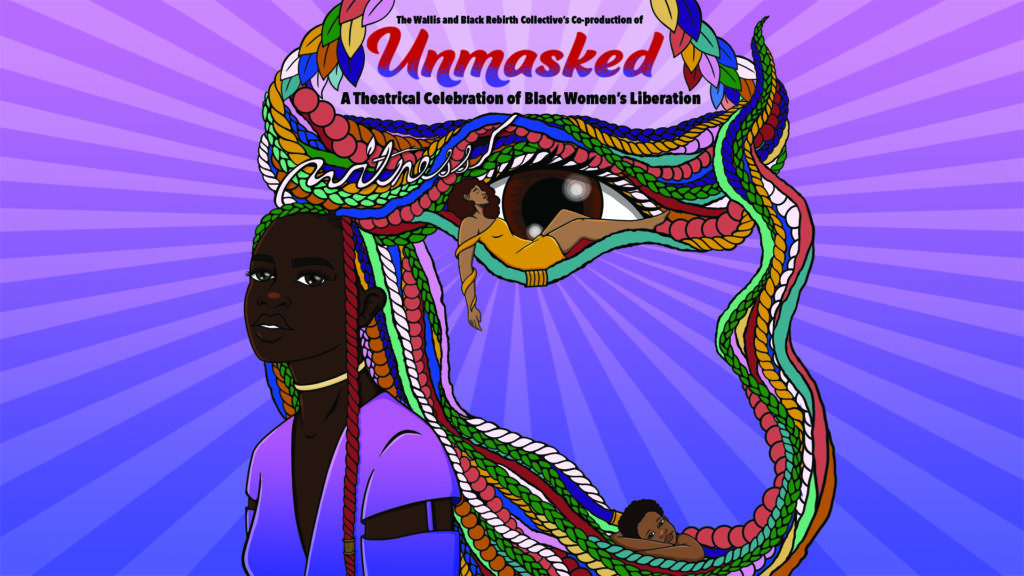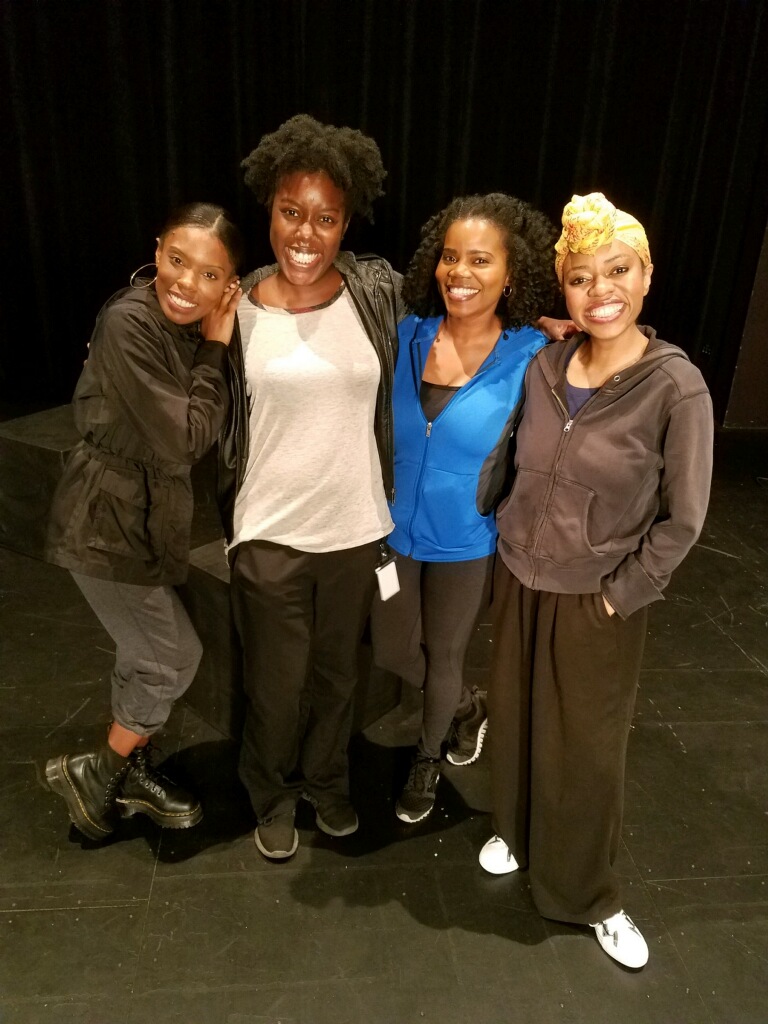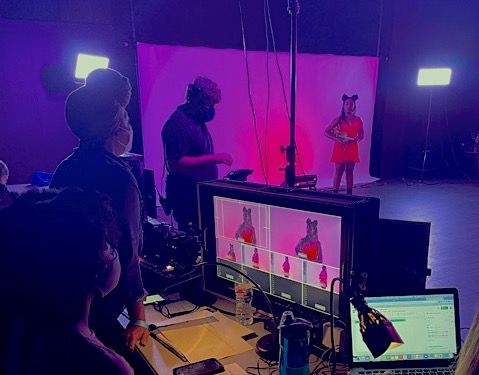
In light of The Wallis and Black Rebirth Collective’s co-production of Unmasked: A Theatrical Celebration of Black Women’s Liberation, co-directors Kimberly Hébert and Camille Jenkins lend us some insight into this powerful theatrical event that was filmed inside The Wallis’ Lovelace Studio Theater. The performance will be available for streaming on Juneteenth through Independence Day: June 19 – July 4, 2021.
Q: What kind of revelations will these performances offer to the audience, as it relates to Juneteenth and the black female experience?
CJ: These performances will offer the audience an opportunity to witness the diverse array of lives, perspectives, trials, and tribulations of black women.
KH: As with all art, these four pieces, written by four extraordinary playwrights, many with whom audiences may not be acquainted, seek to ask more questions than offer answers with regard to the scope and expansive nature of Black feminine experience throughout the African Diaspora. Each play lives in its own world and has an authentic voice, which illustrates that Black women are not a monolith nor should we be engaged with from the perspective of singularity. These pieces cry freedom from that notion, which is why it is a special honor to have this visual reclamation of liberation launch on Juneteenth. Juneteenth holds within it the paradoxical nature of our country. Many Americans might not be aware of this holiday, as it is the pronouncement of manumission from slavery over two years after the Emancipation Proclamation to the enslaved in Texas. This holiday asks us to look deeply into how freedoms have been experienced as well as withheld in this American experiment. Particularly in a time when critical race theory is being challenged, having the plays run from Juneteenth through July 4th seems to be asking us to hold two challenging truths about our shared history.
Q: How did you select these plays? What is your relationship with the four playwrights?
CJ: Kimberly and Black Rebirth Collective provided these plays. They have relationships with some of the most prominent and celebrated black female playwrights in the country. The Wallis was incredibly fortunate to have a co-producer who could help us curate such outstanding works of art. In selecting the plays, The Wallis and Black Rebirth Collective had many conversations about the work and our intention for the event. These plays are challenging, cerebral, provocative, and inspiring.
KH: Yes, Black Rebirth Collective is fortunate to have fostered and maintained artistic friendships with wonderful human beings and talented artists as we have been growing our collective. Our network within the Black arts community is deep and wide. Many artists who visit you in your living rooms on television weekly, or whom most have watched receive the highest honorifics in Hollywood and beyond are actually friends of Black Rebirth Collective. Their commitment to remaining connected to grassroots Black art that offers stories and characters that expand the narrative of Black humanity is our greatest tie. These four playwrights are friends of Black Rebirth Collective. I know all four of these women personally and have worked with each of them on other works that they have created.
Q: Talk to us about “Unmasked.” What does that word mean to you in terms of this theatrical event?
KH: “Unmasked” means a removal of a false self-representation of oneself and an unveiling of the true self. It is deliberate and self-initiated. It is the decision to stand in an authentic sense of self, an authentic Black femininity, without the concern of the outside gaze or the intrusion of the “other.” Sometimes, that unmasking is challenging, messy, ridiculous, and scary. These plays embody the complicated nature of that kind of self-initiated freedom.
CJ: Who are black women when they are given the freedom to undeniably be themselves, to exist as themselves in this world? In addition, the title Unmasked is also a reclaiming of that word in today’s times as masks are a powerful symbol in theatrical history, liturgy, and study.
Q: How was it filming inside the Lovelace Studio Theater? Any challenges or triumphs?
KH: Filming in the Lovelace Studio Theater was fantastic. The space was a blank canvas onto which I could imagine the stories in many ways. I was particularly grateful to have Camille (co-director), Jason (DP/editor), and Pablo (lighting designer) in the space, as creating the pieces with these additional voices made it a very collaborative experience. As a person who loves live theatre, one of my major challenges was coming to terms with filming theatre. The theatre experience has always been so sacred to me, and filming these pieces made me want to hold true to that theatrical experience that we all have when we are watching live theatre. Once the process began, and the actors inhabited the space, it felt like old times. It was magical.

CJ: Filming in the Lovelace was a blast! It was a perfect space to transform into whatever world we wanted to create. I really didn’t see any downsides to it at all.
Q: Tell us about this partnership between The Wallis and Black Rebirth Collective? When did it start and what are you looking forward to?
CJ: This partnership started pre-pandemic when The Wallis and BRC were discussing doing a comedy kickback for Junteenth 2020. Kimberly and I had been talking as early as fall 2019. After the pandemic, The Wallis knew we wanted to do theater that meets this moment. In addition, I had kept in touch with Kimberly and BRC through 2020. Before we started this project in earnest, it felt like such a great opportunity for a true partnership—and it was!

KH: As with so many programmatic plans, the pandemic halted our efforts, as we were all trying to understand what the moment meant for us personally and what it meant for our organizations. During that time, White American Theatre was also being asked to hold itself accountable in the perpetuation of obstacles that the BIPOC community experiences in this arena. Camille and I remained in touch, and early this year, I came to her with the idea of a one act play festival, which restarted our conversation about collaboration. There has been such an evolution with this partnership, because as Paul Crewes (The Wallis’ Artistic Directer) and Coy Middlebrook (The Wallis’ Associate Artistic Director) entered the dialogue, it became clear to me that there was honesty around how The Wallis wants to move forward in this new theatrical landscape. I believe both institutions learned how to hold space for one another. It is my hope that we will have more opportunities in the future to collaborate on bold, inclusive, and expansive storytelling like Unmasked.
Interview conducted and edited by Chandra Jackson.

